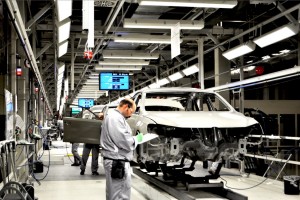It’s going to come down to the wire.
For the third time in the last half decade, hourly workers are Volkswagen’s plant in Chattanooga, Tennessee, are voting to decide if they want the United Auto Workers union to represent them. It was a contentious vote the first time around and only slightly less so this time.
The UAW hasn’t fared well in its organizing efforts in the South, losing by significant margins in recent attempts in Mississippi and Alabama. A variety of factors played into those defeats: a strong anti-union group of workers named Southern Momentum, Republican politicians claiming doom and gloom and the UAW itself as stories of union leaders stealing money to do home repairs, pay off mortgages and other things for themselves have splashed across newspapers and television screens.
However, this time is different — at least that’s what some pro-UAW employees believe. Shannon Fossett, a team leader at the Chattanooga plant, is one of those workers. He campaigned for the UAW in 2014 and said he believes the UAW can win now but believes it will be very close.
“It’s got to happen, we’ve been pushing for a union for years,” he told Reuters. “After all that work, how can it not happen?”
One way for it not to happen is for the powerful opposition voices to be heard, like the echoes of similar voices that rang out against the union last time. Plenty of politicians have gotten on their soapboxes, offering up dire consequences if the plant votes in favor of UAW representation.
Republican U.S. Senator Marsha Blackburn of Tennessee said in a statement it was “deeply concerning that an organization with such a troubled past could soon force their grip onto workers in Chattanooga.” Other conservative politicians in Tennessee have uttered similar types of statements.
The UAW’s response is simple: Volkswagen made $19 billion in profit last year while Chattanooga workers got 50 cent raises because they could not negotiate. The union continues to push that Chattanooga’s workers are the only VW hourly employees not represented by a union.
According to Volkswagen, in 2018 the average assembly worker at Chattanooga earned nearly $55,000 last year and skilled workers made more than $78,000, above the Chattanooga area’s average annual wage of almost $46,000. However, Reuters notes that those figures are well below the the $95,000 and $123,000 the average U.S.-based GM assembly worker and skilled work made respectively, including overtime and profit-sharing bonuses.
“This is not about a pay raise,” Steven Fugat, a 26-year-old tire hanger, told Reuters. “I just want some stability, I want to know when I have to work and when I get to be with my family or helping out at my church.”
Among the complaints about VW Chattanooga, are lax health and safety procedures, of quality of life issues such as constant last-minute changes in scheduling, insufficient vacation time and small bonuses. Voting will run through late Friday.

